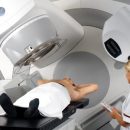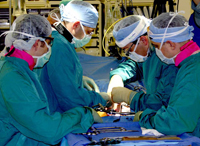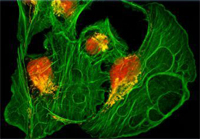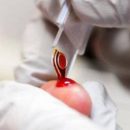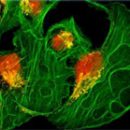Liver cancer is one of the most severe diseases. Unfortunately, it is often unable to reveal at an early stage. What are the symptoms of liver cancer? How it is diagnosed? What factors can contribute to the development of liver cancer?
Content
The risk factors for the occurrence of liver cancer
Risk factor is something that affects the likelihood of disease. With different tumors there are various risk factors. From some risk factors, such as smoking, you can get rid of. Risk factors such as age or family history can not be changed. The presence of one or more risk factors does not mean the mandatory development of the disease.
Famous risk factors that can contribute to the development of liver cancer
Floor. Men are more often ill and liver cancer compared to women. Perhaps this is due to the more frequent use of alcohol and smoking men.
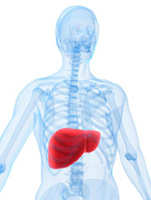 Some liver diseases. Chronic infection (hepatitis B or C) is a very important risk risk factor for liver cancer. There are also some hereditary diseases that increase the risk of liver cancer.
Some liver diseases. Chronic infection (hepatitis B or C) is a very important risk risk factor for liver cancer. There are also some hereditary diseases that increase the risk of liver cancer.
Cirrhosis is the result of the formation of scar tissue in the liver, which often leads to cancer. The most common causes of cirrhosis are alcohol and hepatitis in and with. Another cause of liver cancer - excess iron accumulation in the liver.
Tobacco use. There is a relationship between smoking and the development of liver cancer, the risk increases with simultaneous alcohol consumption.
Aflatoxins. The high risk of liver cancer is associated with the consumption of products affected by Aflotoxin B1 (Mitotoxin aspergilis Flavus mushroom) as a result of improper storage (earthy nuts, wheat, soybeans, corn, rice, etc.).
Anabolic steroid - Men's hormones are used by some athletes. Long-term use of anabolic hormones can somewhat increase the risk of liver cancer.
Arsenic. In some parts of light, the use of water polluted arsenic increases the risk of liver cancer.
Contraceptive drugs. The use of these drugs can somewhat increase the risk of liver cancer. Currently, new types of contraceptive drugs are applied and their influence on the risk of liver cancer is not yet known.
How the liver cancer is detected
Due to the fact that liver cancer usually does not give symptoms until the tumor reaches large sizes or goes beyond the body, it is rarely detected in the early stages. In addition, there are no liver cancer screening methods currently, and it is impossible to detect a small tumor during palpation.
Sometimes cooking cancer can be diagnosed during blood test on Alfa-Fetoprotein protein (AFP). This protein is normally present in the blood of the fetus, but soon after the birth of the child he disappears. When this protein is found in the blood of an adult, you can assume that he has a liver cancer.
Blood research on AFP in order to identify a small liver tumor is performed in people in the group of high risk. Unfortunately, some tumors do not produce enough AFP. Often, when the level of protein in the blood is high, the tumor by that time already reaches large sizes and becomes a failure or has already spread beyond the liver. In some benign liver tumors, elevated levels of AFP may also be celebrated.
Many patients with liver cancer over a long period of time there were cirrhosis of this organ. If the patient with the cirrhosis of the liver marks a deterioration of the state, then this may be due to the development of liver cancer.
Some researchers recommend ultrasound research (ultrasound) in people with liver cancer risk factors. Others begin to examine from determining the level of alpha-fetoprotein (AFP) in the blood and only if it is increased, ultrasound recommended.
There is an opinion on the feasibility of applying the above methods in patients with hepatitis B and C or with any kind of liver cirrhosis.
Symptoms of liver cancer
The symptoms below can be caused by the presence of liver cancer. However, they may cause other tumors or diseases. When any symptoms appear, you must immediately consult a doctor.
- Slimming without visible reasons;
- Long lack of appetite;
- Feeling of stomach overflow when receiving a small amount of food;
- An increase in the size of the liver or detection of the tumor in the liver area;
- Long abdominal pain;
- Yellowish green skin and eyes (jaundice);
- Strengthening weakness in the presence of hepatitis or cirrhosis.
Liver cancer diagnostics
Computed tomography (CT) very effective when diagnosing liver tumors. In some cases, a contrast substance is intravenously introduced to improve the liver image.
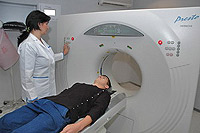 Ultrasound Research (Ultrasound) Allows you to detect a tumor and in some cases its type.
Ultrasound Research (Ultrasound) Allows you to detect a tumor and in some cases its type.
Magnetic resonance Tomography (MRI) Allows not only to detect the tumor in the liver, but sometimes makes it possible to distinguish a malignant tumor from benign.
Angiography. The artery introduces a contrast agent, which allows you to detect vessels, blood supplying tumor, and solve the issue of the operation.
Laparoscopy. Through a small incision in the stomach, a special device is introduced, allowing to examine the liver and other organs, as well as make a biopsy (take a piece of tumor tissue for research).
Research of blood. The definition of alpha-fetoprotein levels (AFP) in the blood is useful both at the stage of diagnosis of liver tumors, and after treatment for judgment on the effectiveness of therapy and a possible recurrence of the disease.
Biopsy. In case of suspected liver cancer, only a biopsy of the tumor makes it possible to finally diagnose.

